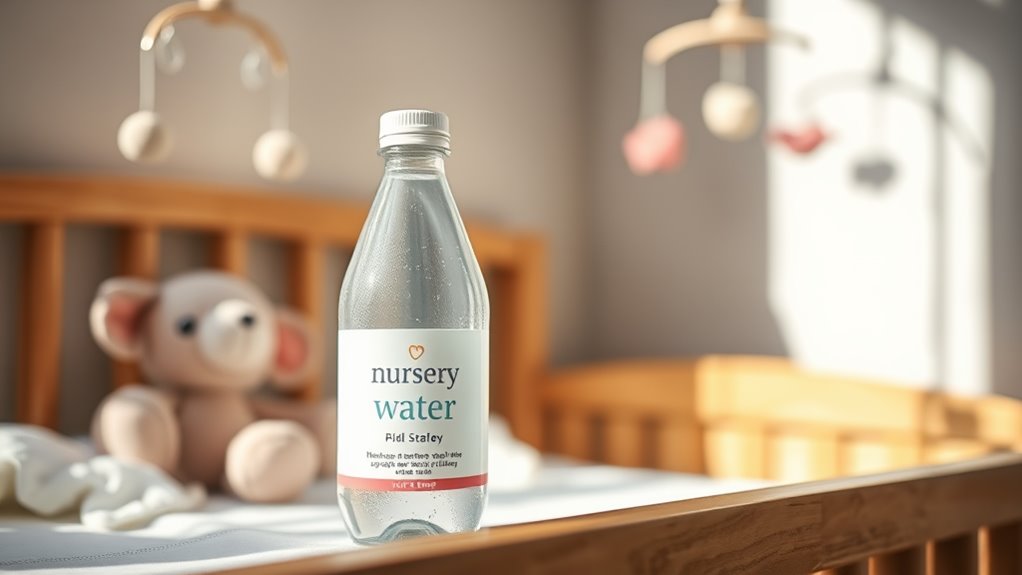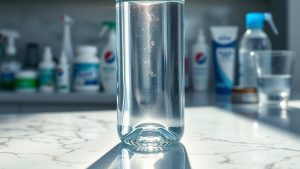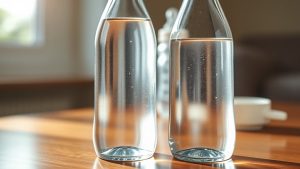What Is Nursery Water and Why Is It Important for Your Baby?
Nursery water is crucial for your baby’s health, but do you know how it impacts their growth and safety? Discover the surprising details now.

Nursery water is specially purified water meant for infants. It's treated to remove impurities and bacteria, making it safe for mixing baby formula, diluting juices, and preparing cereals. While it's non-sterile, boiling it before use is recommended to reduce infection risk. You can choose nursery water with or without added fluoride, depending on your baby's needs. This reliable hydration option has been trusted for over 70 years, and there's more to discover about its benefits.
When it comes to caring for your baby, choosing the right water for formula mixing and hydration is imperative. Nursery water offers a reliable option that many parents turn to for guaranteeing their little ones receive the best possible hydration and nutrition. This specially purified water is designed specifically for infants, using methods like reverse osmosis and distillation to eliminate impurities. Additionally, ozone infusion plays a significant role in removing bacteria, guaranteeing the water is safe for your baby's delicate system.
One of the primary uses of nursery water is for mixing baby formula. This controlled mineral content helps you maintain a balanced diet for your infant. It's also suitable for diluting juices and preparing cereals, making it versatile for your baby's nutritional needs. For babies over six months, nursery water can serve as plain drinking water, and it's an excellent choice for keeping toddlers hydrated when poured into sippy cups.
However, it's important to remember that nursery water is non-sterile. The FDA recommends boiling non-sterile water for infant formula preparation to eliminate any potential risk of infection.
While nursery water is a convenient option, you should be aware of its mineral content. Some products contain added trace minerals like magnesium, potassium, and calcium, primarily for taste rather than nutritional benefits. Additionally, certain nursery water options include fluoride, which can help strengthen your baby's teeth and prevent decay. However, excessive fluoride can pose risks, especially if mixed with other fluoridated products. It's important to discuss your choices with a healthcare professional to find the best option for your baby.
When storing nursery water, keep unopened bottles away from direct sunlight and moisture. Once opened, it should be refrigerated and used within seven days to guarantee its quality. Practicing good hygiene during preparation is significant to maintaining the safety of the water.
If you're considering alternatives, tap water can be safe to use in many areas—as long as it's boiled before use for infant formula. Distilled water is another option, though it lacks the added minerals found in nursery water.
Parents have trusted nursery water for over 70 years, and it was initially developed in response to concerns about municipal water purity. The product line has expanded to meet various infant needs, and healthcare professionals often recommend it for its purity and safety.
As a parent, you can choose nursery water with or without added fluoride based on your baby's specific needs and your pediatrician's advice.
Ultimately, nursery water serves as a safe and effective choice for mixing formula and keeping your baby hydrated. By understanding its benefits and following safety guidelines, you can provide your child with the care they deserve while safeguarding their health and well-being. Always consult your pediatrician if you have questions or concerns about your baby's hydration needs.
Conclusion
In summary, nursery water can be an essential addition to your baby's routine, ensuring they get the right minerals without harmful contaminants. It's amazing how something as simple as water can play such an important role in your little one's development. By choosing nursery water, you're not just quenching their thirst; you're providing peace of mind knowing you're supporting their health. Coincidentally, this small choice can make a big difference in nurturing your baby's well-being.








